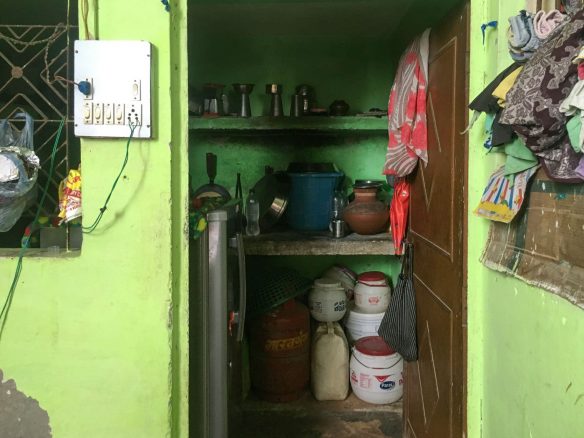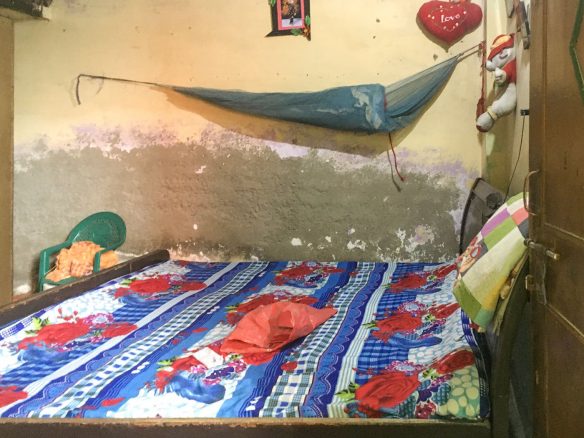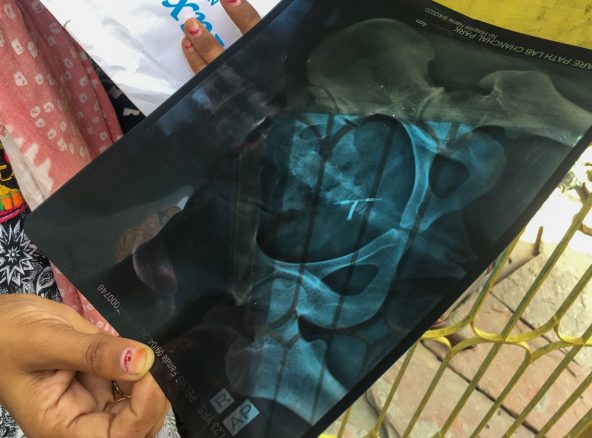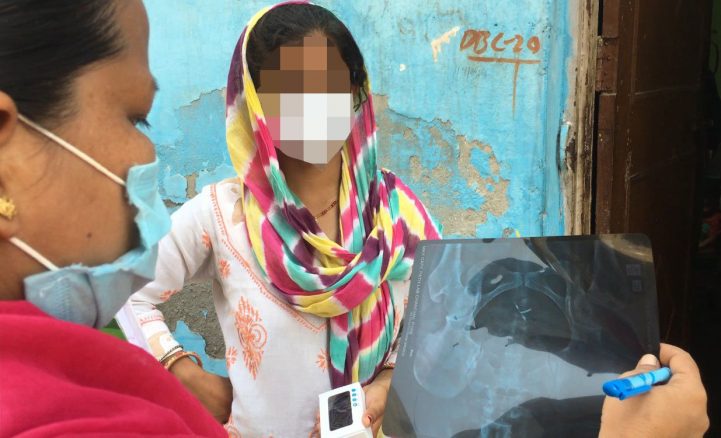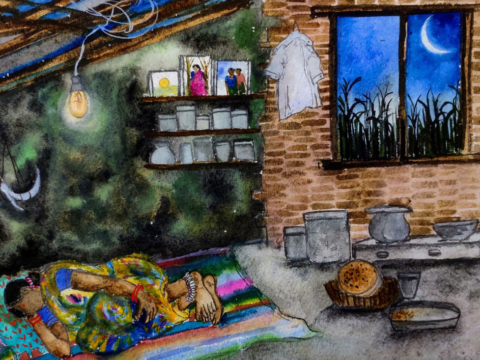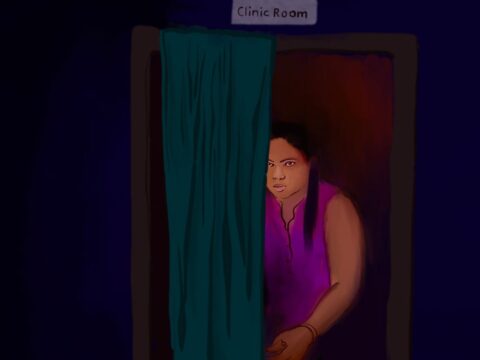
When Deepa left a hospital in Delhi after childbirth, she was not aware a copper-T had been inserted into her. Two years later, when the pain and bleeding began, doctors couldn’t locate the device for months.
When Deepa left the hospital, she was not aware that a copper-T had been inserted into her.
She had just delivered a second child, another son, and wanted to undergo a sterilisation procedure. But the childbirth was done through a C-section surgery, and, Deepa says, “The doctor told me that both the operations cannot be performed at the same time.”
The doctor instead recommended a copper-T. Deepa and her husband Naveen (not their real names) believed it was only a suggestion.
Around four days after her delivery in May 2018, 21-year-old Deepa was discharged from the Delhi government-run Deen Dayal Upadhyay Hospital. “We were not aware that the doctor had inserted a copper-T,” says Naveen.
It was only around a week later when the ASHA worker in their area read Deepa’s hospital discharge report – which Deepa and Naveen had not read – that they realised what had happened.
A copper-T is an intrauterine contraceptive device (IUD) that is inserted into the uterus to avoid pregnancy. “It can take up to three months to adjust and may sometimes cause discomfort to some. This is why we often tell patients to come for regular check-ups at the dispensary [for up to six months],” explains 36-year-old Sushila Devi, the ASHA (Accredited Social Health Activist) who has been working in Deepa’s neighbourhood since 2013.
But Deepa felt no discomfort during the first three months, and, preoccupied with her older son’s illness, she didn’t go for check-ups. She simply decided to continue using the T.
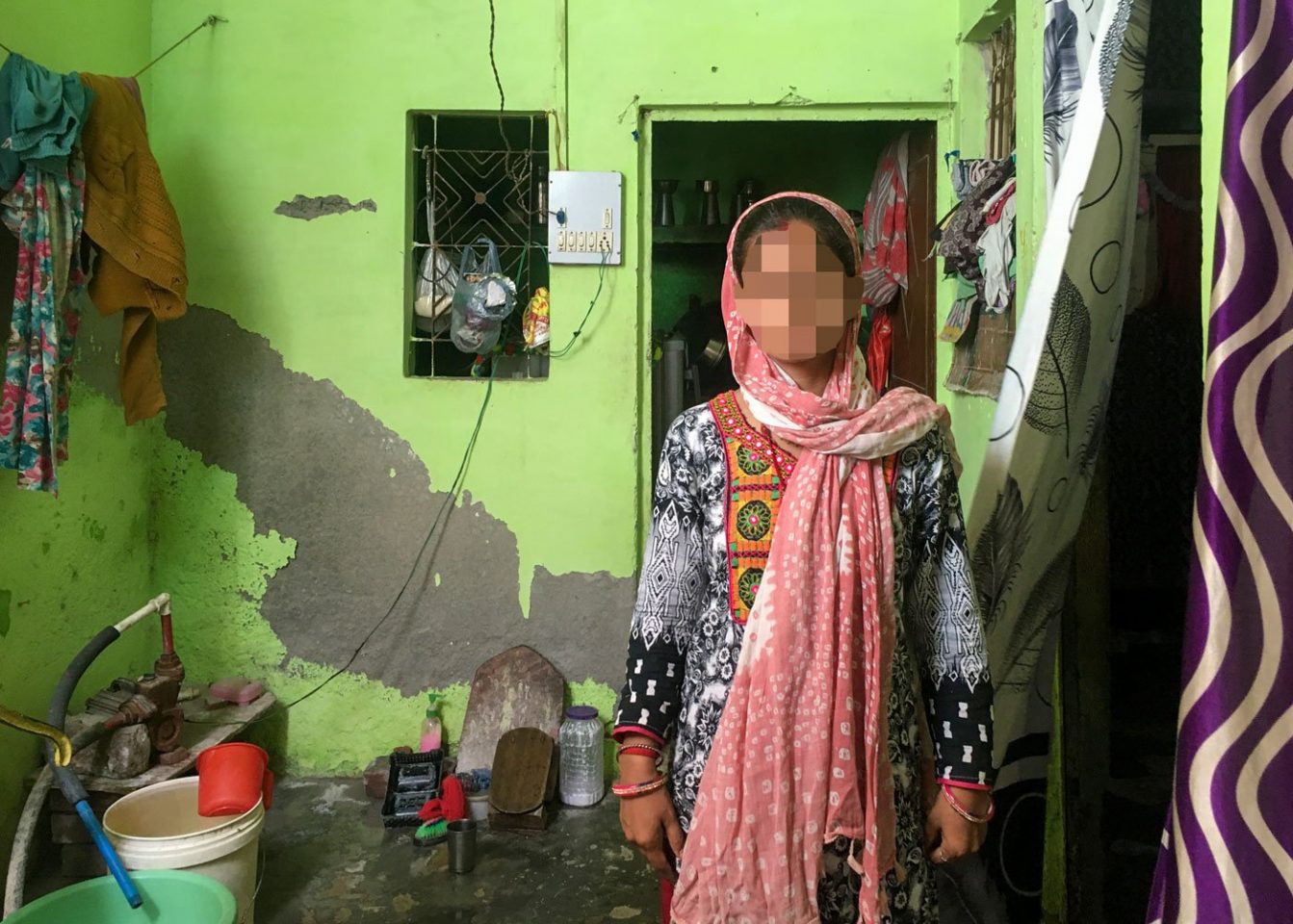
Deepa at her house in West Delhi: preoccupied with her son’s illness, she simply decided to continue using the T
Exactly two years later, in May 2020, when Deepa got her period, the problems began – with excruciating pain.
When the pain continued for some days, she walked to an Aam Aadmi Mohalla Clinic (AAMC) in Delhi’s Bakkarwala area, around two kilometres from her house. “The doctor there prescribed medicines for some relief,” Deepa says. She consulted him for over a month. “When my condition didn’t improve, he referred me to a lady doctor at another AAMC in Bakkarwala,” she adds.
Dr. Ashok Hans, the medical officer in charge at the first Bakkarwala AAMC that Deepa visited, couldn’t recall her case when I spoke to him – he sees over 200 patients every day. “We do give treatment if such a case comes to us,” he told me. “We try to control [irregularities] if it is only related to menstruation. Otherwise, we suggest an ultrasound and recommend other government hospitals.” The clinic did eventually prescribe an ultrasound examination for Deepa.
“When she visited here, she only told me about the menstrual irregularities. Based on which I prescribed her iron and calcium tablets on her first visit,” says Dr. Amruta Nadar at the other smaller AAMC in Bakkarwala. “She didn’t mention about using a copper-T. If she had, we may have tried to locate it through an ultrasound. But she did show a previous ultrasound report, where everything appeared to be normal.” Deepa though says she did tell the doctor about the copper-T.
After the first bout of severe pain during menstruation in May 2020, her problems escalated. “That cycle ended in five days, as was normal for me,” she says. “But in the following months, I began bleeding abnormally. In June, I was menstruating for 10 days. The next month, it increased to 15 days. From August 12, it lasted for a month.”
Sitting on a wooden bed in her two-room cement house on the Nangloi-Najafgarh Road in West Delhi, Deepa adds, “I felt too weak to move during those days. It was a struggle to even walk. I was dizzy, I’d just keep lying down, I wasn’t able to do any work. At times, there was a sharp pain in the abdomen region. Often, I had to change my clothes four times a day because they got soaked from the heavy bleeding. The bedsheets also got ruined.”
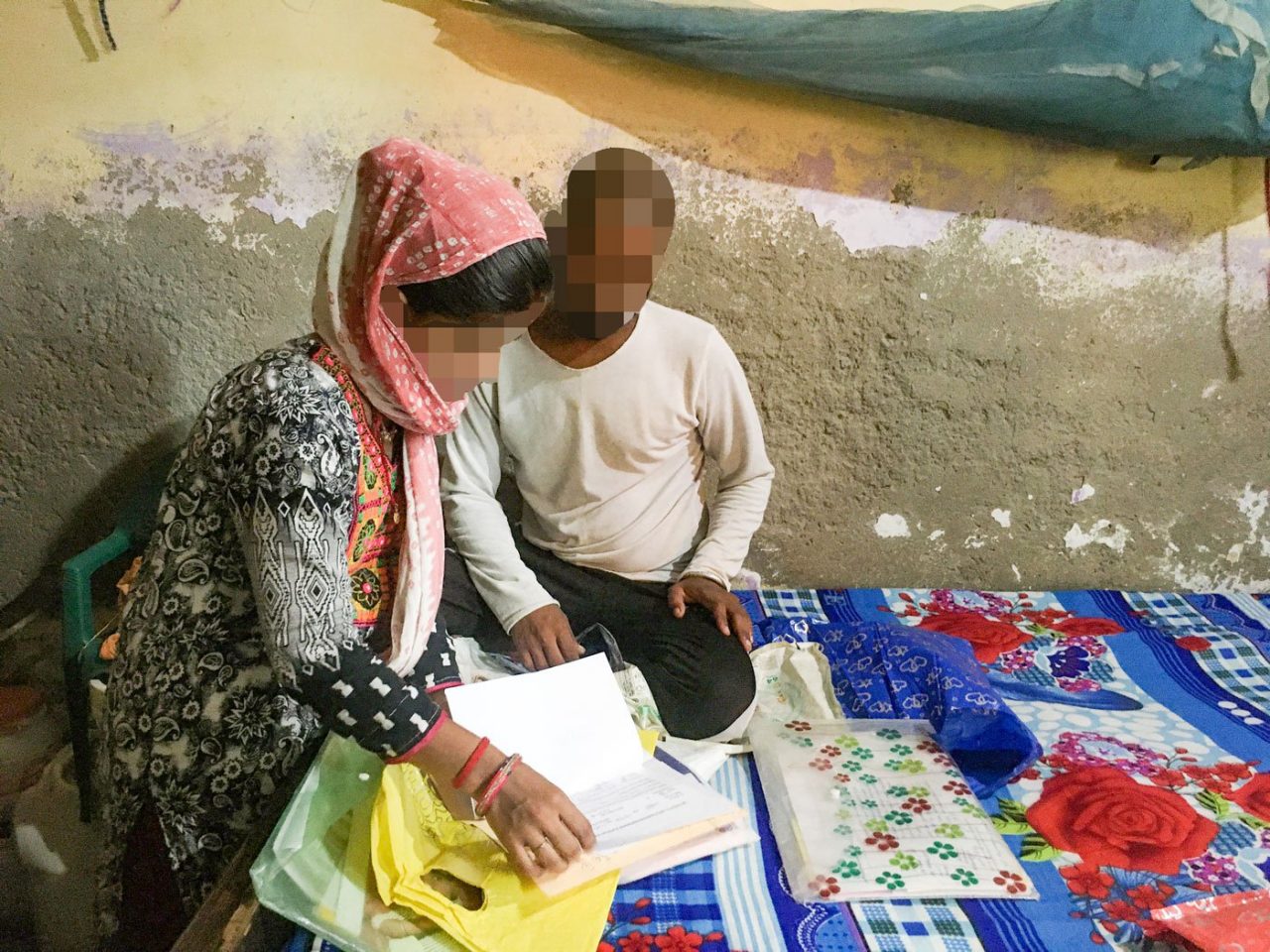
Deepa and Naveen with her prescription receipts and reports: ‘In five months I have visited over seven hospitals and dispensaries’
In July and August 2020, Deepa twice visited the smaller Bakkarwala clinic. Both times, the doctor there prescribed tablets. “We mostly ask patients with menstrual irregularities to track their cycle for a month after prescribing medicines. We are only capable of giving basic treatment here at the clinics. For further evaluation, I recommended she visit the gynaecologist department at a government hospital,” Dr. Amruta told me.
Deepa then took a bus to the nearest one, Guru Gobind Singh Hospital in Raghubir Nagar (around 12 kilometres from her house ), in mid-August 2020. The doctor at this hospital noted ‘menorrhagia’ in the diagnosis – menstrual periods with abnormally heavy or prolonged bleeding.
“Twice I went to the gynaecology department of this hospital,” says Deepa. “Every time, they prescribed medicines for two weeks. But the pain didn’t stop.”
Deepa, who is now 24, has a BA degree in Politics from Delhi University. She was barely three months old when her parents migrated to the national capital from Muzaffarpur in Bihar, in search of work. Her father used to work in a printing press and now runs a small stationery shop.
Her husband, Naveen, 29, who has studied till Class 2, is from Dausa district of Rajasthan and used to work as a school bus attendant in Delhi until the lockdown began.
The couple got married in October 2015, and soon after, Deepa was pregnant with their first son. She wanted to have only one child, given the family’s financial situation. However, her son has been sick since he was barely two months old.
“He has [persistent] double pneumonia. There were days when we have paid thousands of rupees, whatever fee the doctor asked, for his treatment,” she says. “Once a doctor at a hospital told us his survival is difficult, given his condition. It is then that our family members insisted we have another child.”
The couple’s room in their joint family home: ‘I felt too weak to move during those days. It was a struggle to even walk. I was dizzy, I’d just keep lying down’
Before her marriage, for some months, Deepa worked as a teacher at a private primary school, earning Rs. 5,000 a month. Her plans to continue teaching came to a halt because of her older son’s illness.
He is now five years old and undergoing free treatment at Ram Manohar Lohia Hospital (RML) in central Delhi, where she takes him by bus for check-ups every three months. Sometimes, her brother ferries them on his motorcycle.
On one such visit to RML on September 3, 2020, she decided to visit the hospital’s gynaecology department – to yet again try and resolve the problem that various previous visits to other hospitals and clinics had not addressed.
“An ultrasound was done at the hospital to detect [the cause of the frequent pain], but nothing was found,” Deepa says. “The doctor also looked for the copper-T, but could not find that thread either. She too then prescribed medicines and asked me to visit again after 2-3 months.”
Still unsure what caused the abnormal bleeding, on September 4, Deepa visited yet another doctor – this time at a small private clinic in her locality. “The doctor there asked me how I am managing despite such heavy bleeding. She too tried to locate the copper-T but didn’t find it,” Deepa says. She paid Rs. 250 for the check-up. The same day, on a family member’s advice, she had a pelvic X-ray done at a private lab for Rs. 300.
The report stated: ‘The copper-T is seen in situ in hemipelvis region’.
Deepa showing a pelvic region X-ray report to ASHA worker Sushila Devi, which, after months, finally located the copper-T
“There are high chances that a copper-T may get tilted if it is inserted soon after delivery or a C-section,” explains West Delhi-based gynaecologist Dr. Jyotsna Gupta. “This is because in both cases the uterus cavity is enlarged then, and takes time to set itself to normal. While it is doing so, the inserted copper-T may change its axis and get tilted. It may also get displaced or get titled if a woman experiences severe cramps during menstruation.”
Such complaints are common, adds ASHA worker Sushila Devi. “We hear many women complaining about copper-T,” she says. “Many times, they tell us that it has ‘reached their stomach’ and they want to get it removed.”
Only 1.5 percent of women prefer using an IUD as a contraceptive, notes the National Family Health Survey-4 (2015-16). While 36 percent of women in the 15-49 age bracket in the country opt for sterilisation.
“I used to hear from others that copper-T doesn’t suit all women, and may cause problems,” says Deepa. “But I hadn’t had any issues for two years.”
After months of struggling with pain and excessive bleeding, in September last year, Deepa decided to go to the government-run Bhagwan Mahavir Hospital in Pitam Pura in North West Delhi. A relative working in the security department at the hospital had suggested she meet a doctor there, but after taking a Covid-19 test. So on September 7, 2020, she took the test at a dispensary near her house.
She tested positive and was quarantined for the next two weeks. She could not visit any hospital to get the copper-T removed until she tested negative.

‘We hear many women complaining about copper-T’, says ASHA worker Sushila Devi; here she is checking Deepa’s oxygen reading weeks after she tested positive for Covid-19 while still enduring the discomfort of the copper-T
When a nationwide lockdown was imposed in India in March 2020 and schools were also shut, her husband Naveen, until then a conductor (attendant) in a school bus, lost his job of Rs. 7,000 a month, and had no work for five months. He then worked as a helper with local caterers for an occasional Rs. 500 a day. (It’s only last month, in August 2021, that he has found work in an idol-making factory in the Bakkarwala area for Rs 5,000 a month.)
On September 25, Deepa tested negative for Covid-19 and was waiting to hear from the Bhagwan Mahavir Hospital. A relative had taken her X-ray report there to show to a doctor – who too said that the copper-T cannot be removed at this hospital. Instead, she was asked to go back to Deen Dayal Upadhyay Hospital (DDU) – where the IUD had been inserted in May 2018.
Deepa then spent the first week of October 2020 visiting the gynaecology outpatient clinic at DDU Hospital. “I asked the doctor to take out the copper-T and requested sterilisation instead. But she told me that sterilisation procedures are not being carried at the hospital due to Covid-19,” she recalls.
She was told that they can remove the copper-T when she undergoes sterilisation – once the service restarted.
More medicines were prescribed. “The doctor said if there is any problem, we will handle it but it should get resolved with medicines,” Deepa had told me in mid-October last year.
(This reporter visited the gynaecology OPD at DDU Hospital in November 2020 to speak with the department head about Deepa’s case, but the doctor was not on duty that day. Another doctor present suggested I first take permission from the hospital’s medical director. I then made multiple attempts to reach the director by phone, but there was no response.)
I am not sure if she used any auzaar [tools, to extricate the copper-T]…. The midwife told me that if I had not got it removed for a couple of more months, I would have risked my life.
“All government hospitals suffered due to diversion of focus towards management of the pandemic, which struck this city heavily,” says a senior officer at the Directorate of Family Welfare, Delhi. “As some hospitals were converted into Covid hospitals, routine services, including family planning, suffered. Permanent procedures such as sterilisation suffered to a great extent. But at the same time, the availability of temporary methods was increased. We tried our best to sustain these services – whatever was possible.”
“Family planning services were suspended for a long time last year, during which time a lot of clients were denied services,” says Dr. Rashmi Ardey, director, clinical service, Foundation of Reproductive Health Services in India. “Now, overall, the situation is definitely much better, with government guidelines in place to access these services. But the supply of the services has yet not reached the pre-pandemic level. This has a long-term impact on women’s health.”
Unsure of what to do next to resolve her problem, on October 10 last year Deepa consulted a midwife in her area. She gave her Rs. 300 and got the copper-T removed.
“I am not sure if she used any auzaar [tools, to extricate the copper-T]. She might have. I was lying down. She took the help of her daughter who is studying medicine. It took them about 45 minutes,” she says. “The midwife told me that if I had not got it removed for a couple of more months, I would have risked my life.”
Deepa’s irregular menstruation and pain have stopped since the removal of the copper-T.
Arranging all her prescription receipts and reports from various hospitals and clinics on her bed, she had told me in September 2020: “In these five months I have visited over seven hospitals and dispensaries,” spending scare money each time when both she and Naveen had no work.
Deepa remains sure about not having any more children, and still plans to eventually undergo tubal ligation. And she wants to take the civil services exam. “I have got the [application] form,” she says, hopeful of moving ahead with her plans to help support her family, which, she says, got stalled due to the pandemic and the copper-T.
PARI and CounterMedia Trust’s nationwide reporting project on adolescent girls and young women in rural India is part of a Population Foundation of India-supported initiative to explore the situation of these vital yet marginalised groups, through the voices and lived experience of ordinary people.
Want to republish this article? Please write to zahra@ruralindiaonline.org with a cc to namita@ruralindiaonline.org

